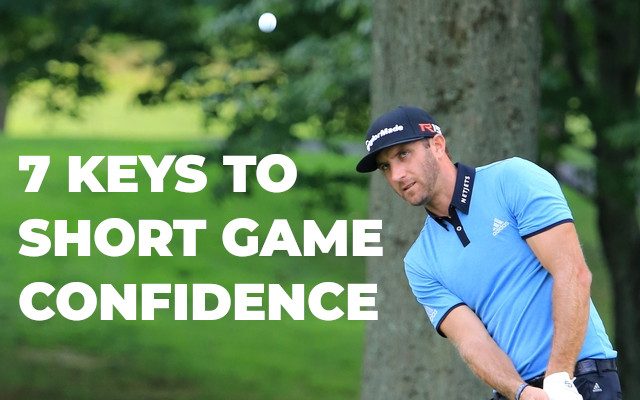
7 Keys To Short Game Confidence
The short game is the area of the game that requires the most use of fine motor skills, which is why some players can struggle. Because precision is required (touch, contact, face control, etc.), a player’s mental state is a huge factor.
If you don’t have confidence, focus and commitment to your short game shots, you won’t be able to access your best physical skills, no matter how good they are.
Understanding How Fear Affects Short Game Confidence
Players who are struggling with short game confidence feel more pressure and fear around it, so the first step to getting better is understanding how this affects the execution of a short game shot.
I hear all the time how a player has a “great short game in practice”, but on the course it disappears. The reason: fear.
Fear makes you focus more on what could go wrong, rather than the outcome you desire. Focusing on the possible negative outcomes such as poor contact (hitting thin or fat shots), what the reaction will be from your playing partners, not making a fluid swing and throwing away strokes takes focus and energy away from what is most important. This fear can also cause physical changes as heart rate and muscle tension rises.
These changes in mental and physical state mean that the intention for the shot is lost, the mind and body are not relaxed, and the messages being sent to the muscles are unclear. Let’s take a look at how you can reduce fear and build short game confidence.
1. Make Short Game Process the Goal
As with all my mental coaching for golf, we are striving for those things that are within our control, not results. We need clear goals for what you are going to bring your attention to before, during and after every shot, and the success of it is about achievement of those goals, rather than the outcome of it.
What do you need to do to hit a good shot? Write down 3-4 things that you will do before, during and after every short game shot. The answer to this question shouldn’t change from shot to shot i.e., your process for your short game will be the same during a round. This is why I created my mental game scorecard, which you can access at the bottom of the article.
2. Controlling Nerves in The Short Game
When your heart rate goes up, it means that your nervous system is on “high alert”. Energy flows away from your brain towards your muscles (which is one of reasons that focusing is harder and you shake over some short game shots and putts). Going through the steps in this article will help lower arousal, but there will always be times when you feel pressure and your heart rate (or “arousal level”) goes up. For this reason, the skill of arousal control and being able to control heart rate needs to be practiced.
3. Seeing yourself having short game confidence
If you close your eyes and imagine yourself playing short game shots, can you see yourself being successful? If you can’t, you will struggle to do it for real. Do some visualization for golf exercises – close your eyes and see yourself hitting an array of short game shots, under pressure in tournaments (make it vivid). If you can see it, you can believe it’s possible. Do this often as it will increase your self-belief.
4. Focus In The Short Game
When you are doing short game practice, I’m sure that your focus is more “external” and on the intention for the shot you want to hit (i.e. the look of the shot and feel of impact). On the golf course, because of fear of making a bad swing and getting a negative outcome, that focus can move “internal” and more on the swing. The player believes that if they can just make the correct movement, they will avoid the outcomes they fear. Unfortunately, that approach rarely works.
Studies have proven that, with short game and putting especially, focus for any level of player is always better on the intention for the shot (external focus), rather than what the body is doing. Once the shot has been decided upon, the rest of the process/shot must be largely external and athletic, as opposed to internal and instructional.
5. Post Shot Routine
The post shot routine is a very overlooked part of the process. If a player doesn’t have a good post shot routine or is unaware, they will store the bad shot/experience deeply (by not being able to move on). This then affects their overall belief and confidence in their short game. Develop awareness and choose good responses to bad shots that you will inevitably hit (even the pros do too) from time to time.
6. Being Present
Following on from this, if a player is not able to reconcile with the experience of hitting a poor shot (and do it quickly), they can ruminate on it in between shots, which can affect mood and lower performance. Being able to be present and aware of what you are placing your attention on in between shots (ideally what you are sensing rather than your thoughts) is a key factor in a player’s success.
7. Short game practice under pressure
To get better at dealing with the pressure you feel on the course, it makes sense that you put yourself to the test under pressure during practice. Set up a practice environment with challenges and consequences that will make you feel nervous and increase arousal, so you can put some of these strategies to the test.
Photo 57797061 © Droopydogajna | Dreamstime.com


